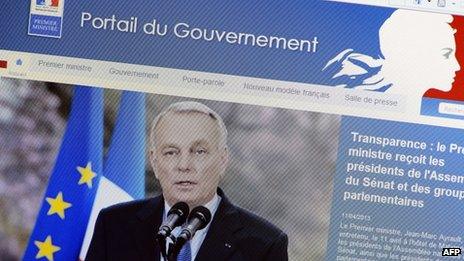Cahuzac scandal: Ministers grumble as assets published
- Published

The declaration of French ministers' assets is exciting a good deal of prurient interest.
It turns out that Michele Delaunay, the otherwise obscure minister for the aged, has a fortune of 5.4m euros (£4.6m; $7.1m). Most of it is in the form of real estate, but includes 200,000 euros worth of furniture and paintings.
Communications minister Aurelie Filipetti has a 70-sq-m apartment in Paris, plus - as she jokingly revealed when asked on French television - a "David Beckham t-shirt".
Arnaud Montebourg, the left wing minister for economic renewal, has a share in properties in Paris and Burgundy, as well as a Peugeot 407 and an armchair by designer Charles Eames.
Ecology minister Delphine Batho has 16,601 euros in various bank accounts.
All 37 ministers in the socialist government have willingly fallen in with President Hollande's new code of ethics, which is designed to restore public trust after the disgrace of the Cahuzac affair.
Now the French can log on to the government website and find out exactly how much their leaders possess.
Their money, their homes, their cars, their inheritances, their art-works.
'Pure voyeurism'
It is an exercise in collective breast-beating that might serve its primary purpose of getting an embattled government through yet another crisis.
Few will be those members of the public who say it is a bad thing to know more about ministers' private wealth.
But behind their for-the-record avowals, many politicians have deep misgivings about Hollande's Operation Transparency.
Especially if - as the government intends - the compulsory declaration of private assets is extended beyond the government to include MPs and other elected officials as well.
For Claude Bartolone, speaker of the National Assembly and a left-wing socialist, the initiative amounts to "pure voyeurism".
Its effect, he says, will be not to diminish but to increase public contempt for politicians, while making no difference at all to those - like Jerome Cahuzac - who choose to cheat.
Mr Cahuzac, the former budget minister, lied for four months about a secret foreign bank account and resigned late last month.
"But if we had asked him to publish details of his personal wealth, would it have made the slightest difference?," asked Mr Bartolone.
Many fear that the publication of their details will create a simplistic world in which "poor" politicians are seen as more honourable than "rich" ones.
Interests not assets
"Certainly I am wealthy," says Michele Delaunay. "And that is something which will be hard for most French people to understand, given their own straitened circumstances.
"So this is all a very testing experience for me, given the tense political context.
"I have no doubt that the opposition will be in like a shot with their accusations of 'champagne socialist'."
For politicians of both left and right, the obligation to declare their wealth fosters a presumption of collective guilt which is entirely unjust.
Mr Cahuzac, they say, should be seen as what he is: a grotesque exception.
And others argue that the president has simply missed the point.
What really counts in assessing ministers' integrity, they say, is not so much assets as interests.
In the UK for example (contrary to what the French government is saying) there is no obligation for government ministers to publish what they own - only to reveal those interests which might clash with their responsibilities.
Interests, in other words, are public. But assets should be private.
And forcing politicians to make their personal possessions public could persuade many a would-be MP that it's not worth the humiliation.
- Published15 April 2013
- Published15 April 2013
- Published10 April 2013
- Published8 April 2013
- Published4 April 2013